Installing the Printer Driver for Network Connection (macOS)
Install the PPD file (printer driver) under macOS, and then register the machine on the computer from the system preferences.
![]()
You need an administrator name and a password (phrase). For details, consult your network administrator.
For the latest information on the corresponding operating system, see the "Readme.htm" file, located on the CD-ROM root directory.
![]()
Setting procedures using macOS 10.14 are shown as an example. The actual procedure may differ depending on the OS version you are using.
Installing the PPD file
![]() Set the CD-ROM in the computer, and click [macOS]
Set the CD-ROM in the computer, and click [macOS]  (brand name) to display the [macOS PPD Installer] folder.
(brand name) to display the [macOS PPD Installer] folder.
To install the driver from the downloaded file, display the folder that is the location of the downloaded file.
![]() Double-click the package file.
Double-click the package file.
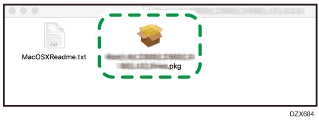
![]() On the [Introduction] screen, click [Continue].
On the [Introduction] screen, click [Continue].
![]() On the [License] screen, click [Continue] and then click [Agree].
On the [License] screen, click [Continue] and then click [Agree].
When prompted to select where to install the driver, specify the install location, and click [Continue].
![]() Click [Install].
Click [Install].
![]() Enter the administrator's user name and password, and then click [Install Software].
Enter the administrator's user name and password, and then click [Install Software].
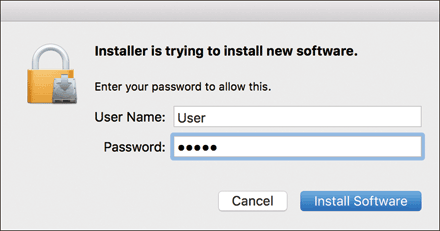
The installation of the PPD file starts.
![]() When the installation is complete, click [Close].
When the installation is complete, click [Close].
Registering the Machine in [Printers & Scanners] for Network Connection
Register the PPD file of the machine in the system preferences to enable printing.
![]() Select [System Preferences...] from the Apple menu.
Select [System Preferences...] from the Apple menu.
![]() Click [Printers & Scanners].
Click [Printers & Scanners].
![]() Click [+].
Click [+].
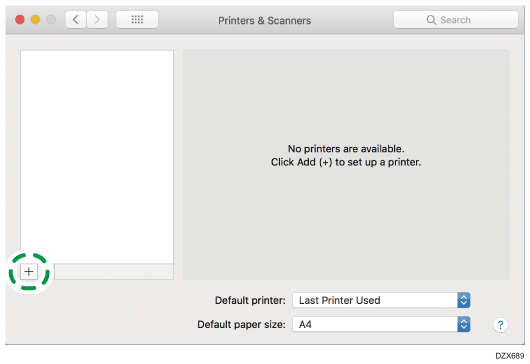
![]() Click [IP], and configure the information of the machine.
Click [IP], and configure the information of the machine.
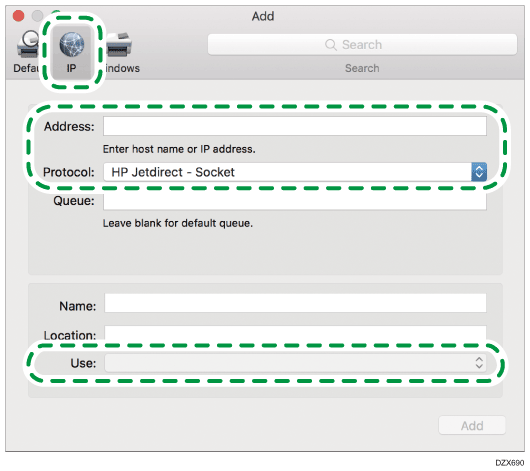
Address: Enter the IP address of the machine.
Protocol: Select [Line Printer Daemon - LPD]. If the printer takes time to perform operations when using the [Line Printer Daemon - LPD] protocol, change the protocol to [HP Jetdirect - Socket].
Use: Check that the machine name is displayed. If "Generic PostScript Printer" is displayed, the entered IP address may not be correct.
When "Generic PostScript Printer" is displayed even though the IP address is correct
Perform the following procedure to select the PPD file of the machine:
Select [Select Software...] on "Use".
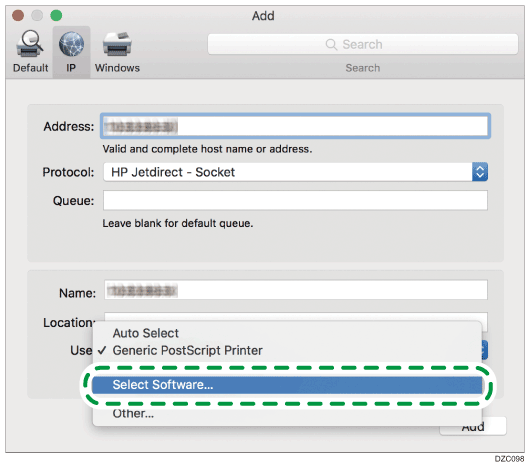
Select the machine on the [Printer Software] screen, and then click [OK].
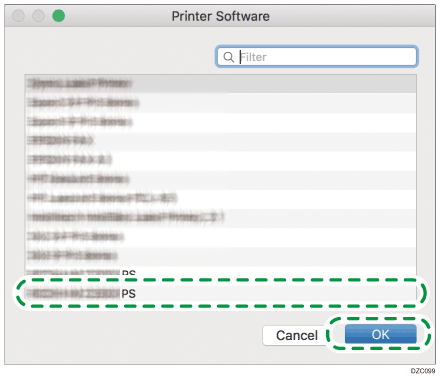
![]() Click [Add].
Click [Add].
The progress screen is displayed.
If the progress screen does not close after a while, click [Configure...] or [Settings] and configure the option configuration of the printer. For the procedure of the option configuration, see Specifying the Option Settings of the Machine for Network Connection.
![]() Check that the machine name is added to the [Print & Scan] or [Printers & Scanners] screen.
Check that the machine name is added to the [Print & Scan] or [Printers & Scanners] screen.
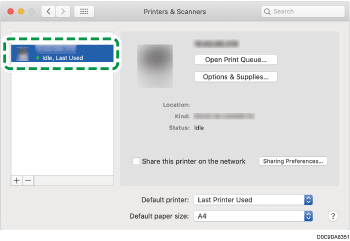
![]() Close the system preferences screen.
Close the system preferences screen.
Specifying the Option Settings of the Machine for Network Connection
If the option configuration of the machine is not automatically reflected, select the option installed on the machine in [Printers & Scanners].
![]() Select [System Preferences...] from the Apple menu.
Select [System Preferences...] from the Apple menu.
![]() Click [Printers & Scanners].
Click [Printers & Scanners].
![]() Select the machine from the list, and then click [Options & Supplies...].
Select the machine from the list, and then click [Options & Supplies...].
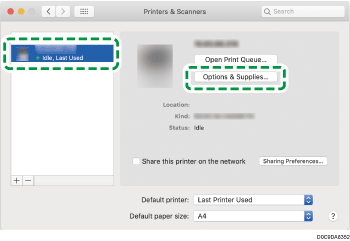
![]() Click [Driver] or [Options], select the option installed on the machine, and then click [OK].
Click [Driver] or [Options], select the option installed on the machine, and then click [OK].
If the usable options are not displayed, the IP address has not been entered correctly or the PPD file has not been registered properly. To enter the IP address or register the PPD file, see Registering the Machine in [Printers & Scanners] for Network Connection.
![]() Close the system preferences screen.
Close the system preferences screen.
![]()
If the option you want to select is not displayed, PPD files may not be set up correctly. To complete the setup, check the name of the PPD file displayed in the dialog box.
Setting procedures using macOS 10.14 are shown as an example. The actual procedure may differ depending on the OS version you are using.
To specify an optional Adobe PostScript when using a PostScript 3 printer driver, select [Adobe PostScript] in the "PostScript:" list on the [Options] tab.
